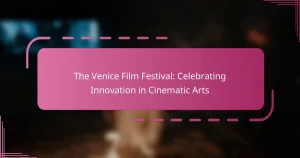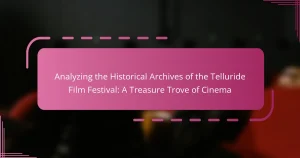The New York Film Festival is an annual event in New York City, organized by the Film Society of Lincoln Center, that has been showcasing new films from around the world since 1963. This festival emphasizes artistic and innovative storytelling, featuring premieres, special presentations, and retrospectives that reflect diverse cultural narratives and societal issues. By providing a platform for underrepresented voices and independent filmmakers, the festival encourages dialogue and reflection among audiences. The New York Film Festival plays a significant role in shaping cultural conversations and can influence public perception, while also impacting local economies through tourism and related activities.
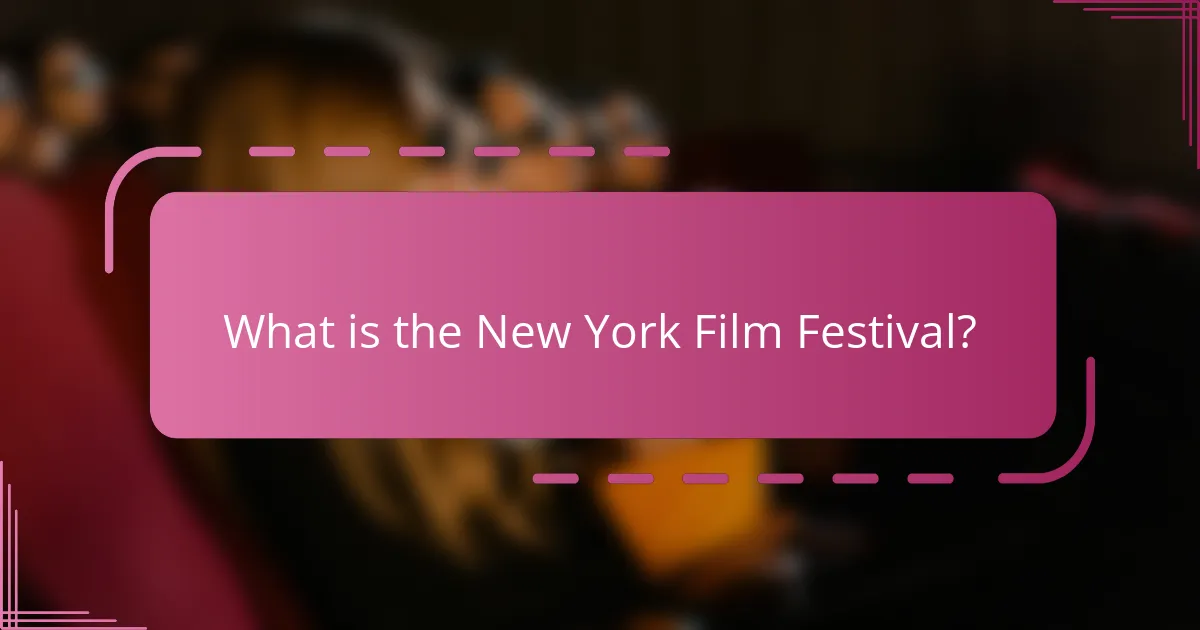
What is the New York Film Festival?
The New York Film Festival is an annual film festival held in New York City. It showcases a selection of new films from around the world. The festival is organized by the Film Society of Lincoln Center. It typically takes place in late September to mid-October. The New York Film Festival has been held since 1963. It is known for its emphasis on artistic and innovative films. The festival features premieres, special presentations, and retrospectives. It plays a significant role in shaping cultural narratives through cinema.
How did the New York Film Festival begin?
The New York Film Festival began in 1963. It was established by the Film Society of Lincoln Center. The festival aimed to showcase the best in world cinema. It sought to present a diverse range of films. The inaugural event featured 32 films from various countries. It gained immediate recognition for its curated selection. The festival has since become a major cultural event. It highlights both established and emerging filmmakers.
What were the founding principles of the New York Film Festival?
The founding principles of the New York Film Festival focused on showcasing innovative and artistic cinema. It aimed to present films that challenged conventional storytelling and aesthetic norms. The festival prioritized international films, emphasizing cultural diversity and global perspectives. Additionally, it sought to create a platform for filmmakers to express their unique visions. Established in 1963, the festival highlighted the importance of film as an art form. Its commitment to quality and creativity has influenced cultural narratives over the decades. The festival has consistently supported independent filmmakers and avant-garde works. These principles have solidified its reputation as a premier film festival worldwide.
What notable films premiered at the first festival?
The first New York Film Festival premiered several notable films. Among them were “The Last Picture Show” directed by Peter Bogdanovich. Another significant film was “The Go-Between” directed by Joseph Losey. These films contributed to the festival’s reputation for showcasing innovative cinema. The festival took place in 1963 and highlighted diverse storytelling. It aimed to present international films alongside American cinema. This approach influenced cultural narratives in the film industry. The festival has since become a platform for emerging voices and established filmmakers.
What is the significance of the New York Film Festival in the film industry?
The New York Film Festival (NYFF) is significant in the film industry as it showcases a diverse selection of films from around the world. Established in 1963, it has become a platform for both established and emerging filmmakers. The festival highlights innovative storytelling and unique cinematic voices. It often features films that later receive critical acclaim and awards. Notably, many films premiere at NYFF before entering the awards circuit. This festival plays a crucial role in shaping cultural narratives through its curated selections. It provides audiences with access to international cinema that may not be widely distributed. The NYFF also fosters discussions around film and culture, influencing industry trends.
How does the festival influence filmmakers and audiences?
The festival influences filmmakers and audiences by providing a platform for diverse storytelling. Filmmakers gain exposure to new audiences and industry professionals. This exposure can lead to distribution deals and funding opportunities. Audiences experience a variety of cultural narratives that broaden their perspectives. The festival also fosters discussions around social issues depicted in films. This engagement can influence public opinion and cultural trends. Additionally, networking opportunities at the festival can lead to collaborations among filmmakers. Overall, the festival acts as a catalyst for innovation and dialogue in the film industry.
What role does the festival play in film distribution?
Film festivals play a crucial role in film distribution by serving as platforms for showcasing new films. They provide filmmakers with opportunities to connect with distributors, buyers, and audiences. Festivals often attract industry professionals who seek unique content for theatrical release or streaming platforms. For example, the Sundance Film Festival has historically launched many successful films into the mainstream market. Additionally, awards and recognition at festivals can enhance a film’s visibility and marketability. Festivals also facilitate networking opportunities that can lead to future distribution deals. Overall, they are integral to the promotion and accessibility of independent and international films.
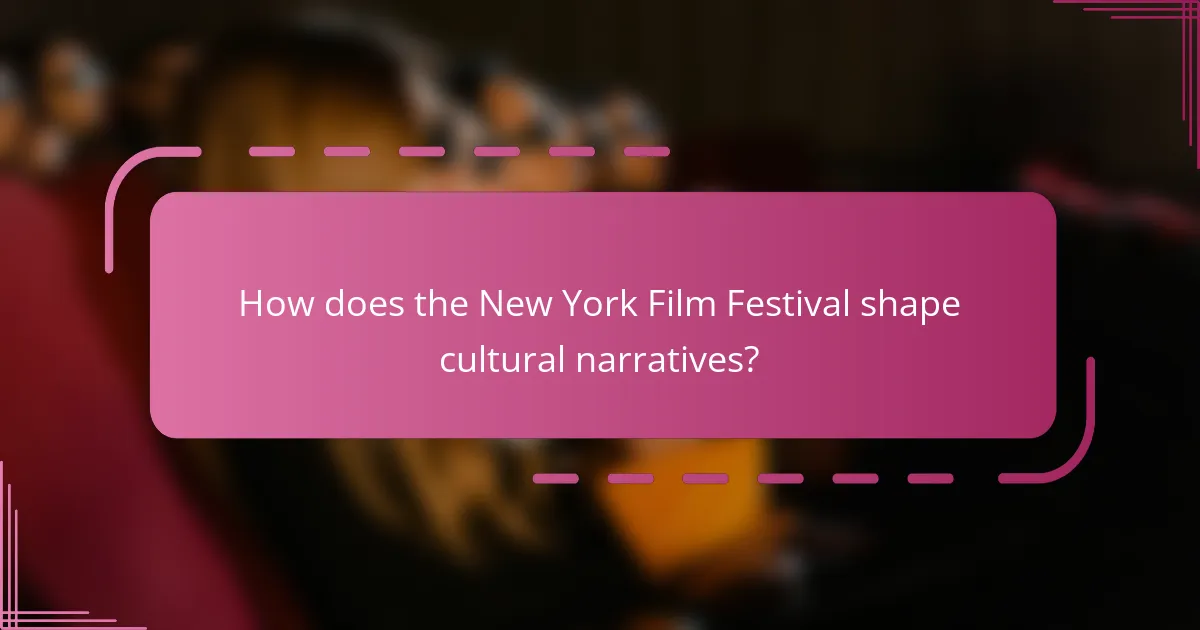
How does the New York Film Festival shape cultural narratives?
The New York Film Festival shapes cultural narratives by showcasing diverse films that reflect societal issues. It presents works from various cultures, highlighting underrepresented voices. This festival acts as a platform for filmmakers to address contemporary themes. By featuring innovative storytelling, it influences public perception and dialogue. The festival attracts global attention, amplifying the stories told within its screenings. It often premieres films that later gain critical acclaim, impacting cultural discourse. Historical films presented at the festival can reshape understanding of past events. Overall, the festival plays a crucial role in framing cultural conversations through cinema.
What types of cultural narratives are highlighted at the festival?
The festival highlights diverse cultural narratives that reflect societal issues and human experiences. These narratives include themes of identity, migration, and social justice. Films often showcase personal stories that resonate with broader cultural contexts. Historical events and their impact on communities are frequently explored. The festival also emphasizes underrepresented voices and perspectives. Documentaries and fictional works alike address contemporary challenges. Audience engagement with these narratives fosters dialogue and understanding. The New York Film Festival serves as a platform for cultural exchange and reflection.
How do films selected for the festival reflect societal issues?
Films selected for the festival often mirror societal issues by addressing contemporary themes. These films explore topics such as social justice, inequality, and cultural identity. For instance, films may depict the struggles of marginalized communities. They often highlight pressing issues like climate change or mental health. By showcasing diverse perspectives, these films foster dialogue among audiences. Festivals curate films that resonate with current events and societal challenges. This selection process encourages filmmakers to tackle relevant issues. Ultimately, the festival serves as a platform for raising awareness and sparking conversation about societal matters.
What genres are most commonly featured and why?
The genres most commonly featured at the New York Film Festival include drama, documentary, and independent films. Drama films are prevalent due to their ability to explore complex human emotions and societal issues. Documentaries are featured for their capacity to inform and engage audiences through real-life stories. Independent films often showcase unique narratives that challenge mainstream cinema, attracting diverse audiences. These genres resonate with festival-goers, who seek innovative storytelling and cultural reflection. The festival’s focus on these genres enhances cultural narratives by providing a platform for underrepresented voices and perspectives.
How do filmmakers use the festival to convey their messages?
Filmmakers use the festival to convey their messages through curated screenings and audience engagement. The New York Film Festival provides a platform for diverse narratives. It allows filmmakers to present their works to a receptive audience. This exposure fosters discussions around cultural and social issues. Filmmakers often incorporate relevant themes in their films. They aim to resonate with viewers’ experiences and perspectives. The festival’s environment encourages dialogue and reflection. Historical examples include films addressing social justice or environmental concerns.
What techniques do filmmakers employ to engage audiences with cultural themes?
Filmmakers employ various techniques to engage audiences with cultural themes. They utilize storytelling to reflect cultural narratives and resonate with viewers’ experiences. Visual symbolism is often used to convey deeper meanings associated with specific cultures. Music and sound design enhance emotional connections to cultural contexts. Authentic casting brings genuine representation of cultural identities to the screen. Dialogue that incorporates cultural vernacular fosters relatability and immersion. Filmmakers may also use historical references to ground their narratives in real cultural contexts. These techniques collectively enhance audience engagement and promote cultural understanding.
How does audience reception impact the narratives presented?
Audience reception significantly influences the narratives presented in films. When audiences respond positively to specific themes or characters, filmmakers may adapt future narratives to align with these preferences. Conversely, negative reception can lead to the reconsideration or alteration of narrative elements in subsequent projects. For instance, films that resonate with cultural or social issues often gain traction and inspire similar storytelling approaches. Research indicates that audience feedback shapes industry trends and influences funding decisions. The New York Film Festival showcases this dynamic by highlighting films that reflect audience interests, thereby impacting cultural narratives in broader contexts.
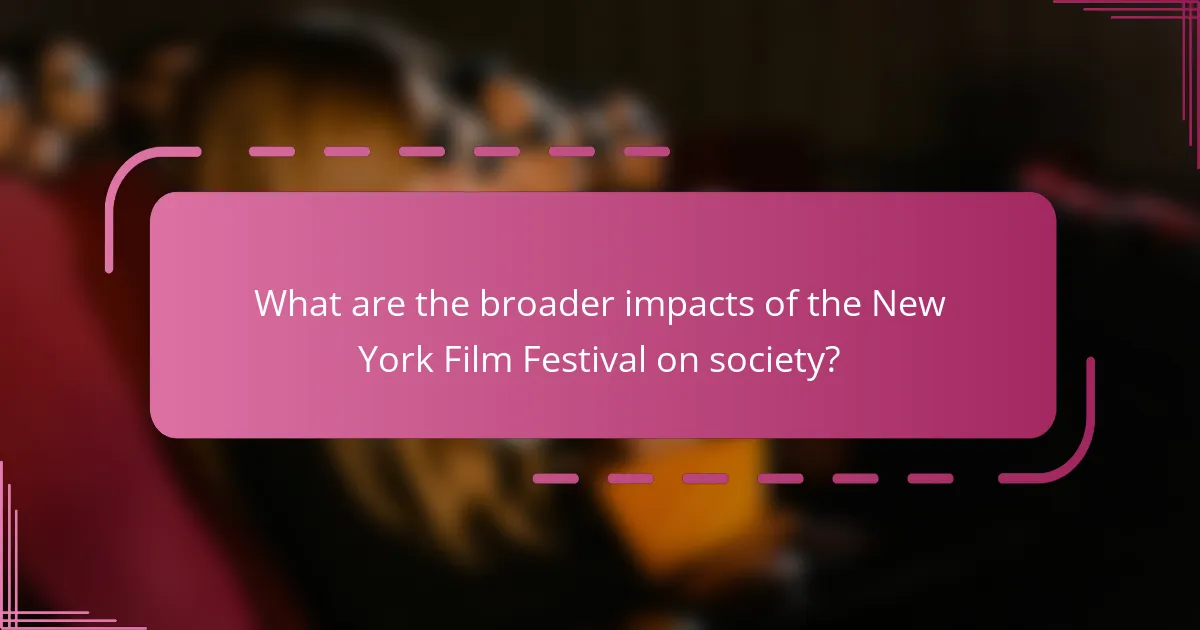
What are the broader impacts of the New York Film Festival on society?
The New York Film Festival influences society by promoting diverse cultural narratives. It showcases films from various genres and backgrounds. This exposure fosters greater understanding and appreciation of different cultures. The festival also supports independent filmmakers, boosting their visibility in the industry. By highlighting social issues, the festival encourages dialogue and reflection among audiences. Historical attendance figures demonstrate its significance, with thousands of attendees each year. Additionally, the festival can impact local economies through tourism and related activities. Overall, the New York Film Festival serves as a catalyst for cultural exchange and social discourse.
How does the festival contribute to cultural diversity?
The festival contributes to cultural diversity by showcasing films from various cultures and backgrounds. It highlights international filmmakers and diverse storytelling. This exposure fosters understanding and appreciation of different cultural perspectives. The festival includes films in multiple languages, reflecting global narratives. It also features panels and discussions that promote dialogue among cultures. By celebrating underrepresented voices, the festival enriches the cultural landscape. This approach encourages collaboration and exchange between artists from different backgrounds. Overall, the festival serves as a platform for cultural expression and diversity.
What initiatives promote underrepresented voices at the festival?
The New York Film Festival promotes underrepresented voices through various initiatives. These initiatives include dedicated programming for filmmakers from diverse backgrounds. The festival features panels and discussions focused on inclusivity and representation. It also offers mentorship programs aimed at supporting emerging artists. Grants and funding opportunities are available for projects by underrepresented creators. Collaborations with organizations that advocate for diversity in film are emphasized. These efforts aim to amplify stories that reflect a broader range of experiences. The festival’s commitment to diversity is evident in its selection of films and events.
How does the festival foster dialogue about cultural differences?
The festival fosters dialogue about cultural differences through diverse film selections. It showcases narratives from various cultures and perspectives. This exposure encourages audience reflection on different societal issues. Discussions and panels during the festival facilitate direct engagement among attendees. Filmmakers share their experiences, providing context to their work. Such interactions create a platform for understanding and empathy. The festival’s inclusive atmosphere promotes cross-cultural conversations. This approach ultimately enriches the cultural narrative landscape.
What lessons can be learned from the New York Film Festival’s impact?
The New York Film Festival demonstrates the importance of diverse storytelling in cinema. It showcases a wide range of voices and perspectives. This inclusivity enriches cultural narratives and broadens audience understanding. The festival also highlights the role of independent filmmakers in shaping cinematic discourse. By providing a platform for innovative works, it encourages creativity and experimentation. Additionally, the festival fosters community engagement through discussions and Q&A sessions. This interaction enhances audience connection to the films. Overall, the festival’s impact illustrates how film can drive social change and promote dialogue.
How can other film festivals replicate its success in shaping narratives?
Other film festivals can replicate the New York Film Festival’s success in shaping narratives by prioritizing diverse storytelling and innovative programming. They should curate films that reflect a wide range of cultural experiences and perspectives. Engaging with filmmakers from underrepresented communities can foster unique narratives. Collaborating with local artists and organizations can enhance community involvement and relevance. Additionally, hosting panel discussions and workshops can deepen audience engagement with the themes presented. Festivals should also utilize social media to amplify voices and narratives. Historical data shows that festivals that embrace inclusivity see increased attendance and community support. For example, the Toronto International Film Festival has successfully highlighted diverse voices, resulting in a broader cultural impact.
What best practices can filmmakers adopt from the festival’s approach?
Filmmakers can adopt several best practices from the festival’s approach. First, they should prioritize storytelling that resonates with diverse audiences. Festivals often showcase films that reflect varied cultural narratives. Secondly, filmmakers can focus on networking opportunities. Festivals provide platforms for collaboration among industry professionals. Third, they should embrace innovative marketing strategies. Festivals utilize social media and audience engagement effectively to promote films. Additionally, filmmakers can learn the importance of feedback. Festivals often facilitate audience discussions that can refine future projects. Lastly, they should consider the significance of timing. Festivals have specific submission deadlines that encourage filmmakers to manage their projects efficiently. These practices can enhance a filmmaker’s visibility and success in the industry.
How can audiences engage with the cultural narratives presented at the festival?
Audiences can engage with the cultural narratives presented at the festival through interactive discussions and Q&A sessions. These formats allow attendees to ask questions and share perspectives. Additionally, workshops and panels facilitate deeper exploration of themes. Participants can also connect with filmmakers and artists during networking events. Viewing films followed by audience feedback sessions fosters community dialogue. Social media platforms enable audiences to share their experiences and insights in real time. Engaging with festival-related content online further enhances understanding of cultural narratives. These methods collectively enrich the audience’s experience and connection to the festival’s themes.
The New York Film Festival (NYFF) is a prominent annual event that showcases innovative films from around the world, significantly influencing cultural narratives since its inception in 1963. Organized by the Film Society of Lincoln Center, the festival emphasizes artistic expression and cultural diversity through a curated selection of premieres, retrospectives, and special presentations. This article explores the festival’s historical background, its role in shaping societal issues through cinema, and its impact on filmmakers, audiences, and broader cultural conversations. Key themes include the importance of diverse storytelling, the festival’s influence on film distribution, and initiatives that promote underrepresented voices in the industry.
